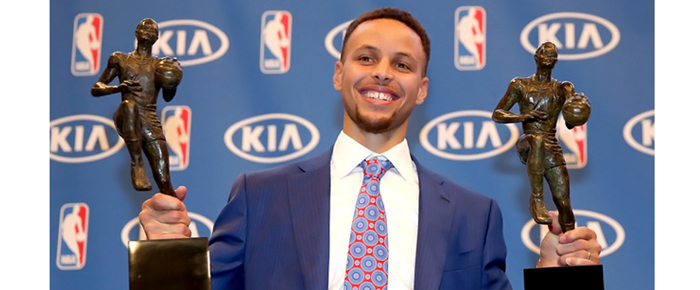
By Flint Wheeler
The NBA has never had a unanimous MVP winner before. Some have close. In 2000, the Lakers’ Shaquille O’Neal received 120 out of 121 possible first-place votes. In 2013, LeBron James, then with the Miami Heat, also fell one vote shy. Considering how many great individual seasons the league has seen, it was worth asking what a player would have to accomplish in order to receive 100% of the votes. Well, this season, Steph Curry showed us.
On Tuesday, the NBA formally announced what every basketball fan on the face of the planet already knew months ago: that Curry would win MVP honors for the second straight season. The only drama surrounding the award was whether or not the Warriors’ point guard would get all 131 first-place votes. Somehow, in a country where you can’t get 131 people to agree on anything, not even on whether the Earth is round, everyone who had a vote – voted for Curry.
And, yes, Curry being this season’s MVP should be exactly as controversial as the shape of the Earth. If any player in NBA history has ever deserved 100% of the votes, it would have to be Curry this season.
Curry led the league in scoring, averaging 30 points per game. During one seven game stretch, he was shooting 56.1% from the field and a ridiculous 56.5% from beyond the three-point line.
This year he went on to obliterate his old record, hitting 402 of them by the end of the regular season. He turned half-court heaves into a reliable part of his offensive game, stretching the court to the point where he became essentially unguardable. Beyond that he averaged 2.1 steals per game, good for best in the league, and, despite being the game’s most productive shooter, he managed to end up in the top 10 when it came to assists per game.
That’s the other thing: despite how gaudy Curry’s numbers look, they never came at the expense of his team or his team-mates. In an almost exhausting round-up of Curry’s impressive numbers, ESPN pointed this out: “Of the nearly 250 players who made at least 150 passes that led directly to a team-mate’s shot, nobody created higher quality looks for his team-mates than Curry.”
His presence alone disrupts defenses to the point where he opens up scoring chances for the rest of the Warriors. Are players like Draymond Green and Klay Thompson extremely talented on their own? Of course. Do they develop into perennial All-Stars with a different team? Maybe not, but I can guarantee you they’re both glad they never had to find out.
These arguments don’t even account for the intangibles, like the fact that Curry was the most entertaining player in the league, not to mention one of the sport’s best ambassadors and a likable presence on and off the court.
The only vaguely coherent argument against Curry, which thankfully didn’t play out, is that even when he is not playing, the Warriors are still a very good team. There’s a strange belief that if a team falls apart without its star player, it’s a referendum on how good that player is rather than a reflection of the quality of the supporting cast.
If you swapped Curry out with, say, the Toronto Raptors’ Kyle Lowry, an All-Star point guard in his own right, the Warriors would still make the playoffs, possibly even get home court advantage in the first round, but they’re not threatening the record of the 1995-96 Chicago Bulls, let alone surpassing it on the last day of the season.
So, it’s fitting that he received the MVP award the day after he made his triumphant return to the postseason. After missing two weeks with a MCL sprain, Curry shook the to-be-expected rust in the first half and guided his team to a victory over the Portland Trail Blazers, scoring an astonishing 17 points in five minutes of overtime to give the Warriors a 132-125 victory and a commanding 3-1 series lead. It was a reminder that the game just looks different when Curry is on the court. He regularly makes the unprecedented seem inevitable.












































